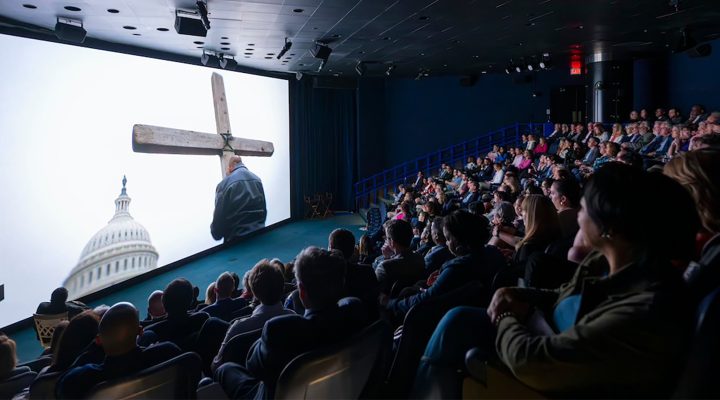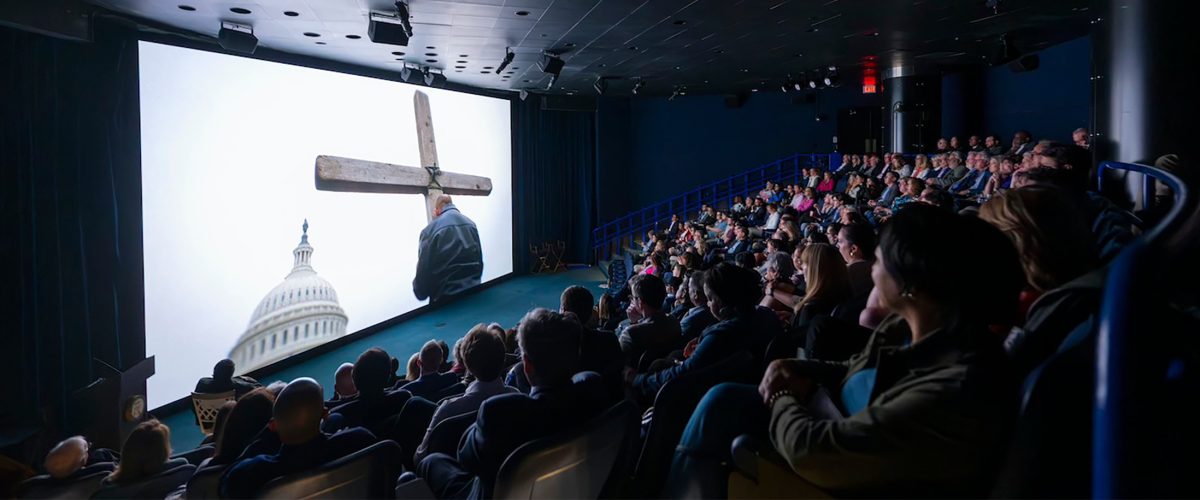Donald Trump’s victorious presidential campaign rode a wave of nationalism and religious hatred as old as humankind itself, said Todd Stiefel, executive producer of the documentary Bad Faith: Christian Nationalism’s Unholy War on Democracy.
The 2024 film shows how Trump benefitted from a rightwing yearning for theocracy present “since the pilgrims arrived,” as well as the “good-versus-evil” trope used to persecute political and religious rivals since ancient times, Stiefel said in a recent episode of “The State of Belief” podcast hosted by Interfaith Alliance.
In the current U.S. situation, an emboldened Christian nationalism used depictions of Democrats as demons and satanists to extol Trump as the nation’s savior and to promote Project 2025 as the plan for dismantling American democracy, he said.
“I frankly see it as part of a timeless battle between truth and misinformation, truth and dogma. It may be new in this country at this scale and during our lifetimes, but this has been playing out for tens of thousands of years. Good-versus-evil for your political opponents led to crusades, led to wars, led to inquisitions.”
It’s also the classic misuse of religion for political gain used by dictators the world over, he added. From it derives propaganda pitting America against the Japanese, the Chinese and Muslims.
“We’re now seeing that as the Republicans are ‘good’ and the Democrats are ‘evil,’ and that the Republicans are the ‘God party’ and the Democrats are the ‘evil atheist party.’ It’s just like during the Red Scare, when we had to root the godless communists out of Hollywood. This is just another phase in a very long battle that is going to continue to happen,” he said.
Moderated by Interfaith Alliance President Paul Raushenbush, the podcast also included Bad Faith director Stephen Ujlaki and social researcher Matthew Taylor, author of The Violent Take It By Force: The Christian Movement That Is Threatening Our Democracy.
Raushenbush said it’s stunning to hear Christian nationalists in the film consistently framing their political and religious actions in militaristic terms: “The thing that kind of blew my mind is this idea of good-versus-evil, spiritual warfare, that all of this is part of the ‘great war’ and they are generals on the good side, and everyone else is demonic or satanic or name your bad word in their lexicon.”
In conducting research for the film, Ujlaki said he was taken aback to find Christian nationalists sharing openly about their strategies for overthrowing democracy, sometimes going back to the 1970s.
A prime example was Liberty Foundation and Moral Majority co-founder Paul Weyrich’s influential “manifesto” denouncing democracy, promoting abortion as a political cause and pushing rightwing churches to support Republican candidates and causes, he said.
“I looked it up and I thought, my God, they have actually written this stuff down, they actually do plan to weaken and destroy democracy. I never believed it. I had the hardest time when I was making the film thinking that these people actually don’t like democracy.”
Project 2025 is a further example of that brazenness, he added. “It’s like we’ve known about these crazy ideas, but to see them just boldly putting them out there public — they are emboldened. They are, ‘Here you go. Here’s the plan. We’re going to disassemble huge parts of the government, and we’re not just going to have the wolves in the hen house, we’re going to have wolves in charge of the hen house.”
The January 6 insurrection invigorated Christian nationalists who took a sense of power and courage from the attack, Ujlaki sad. “There has been a feeling on their part that it’s inevitable, that they are going to win and that their best tactic is to just flaunt it and scare people into submission.”
Interviewed separately by Raushenbush, Taylor noted religious nationalism is not only a historical phenomenon but a globally surging one, as well: “You don’t have to stretch very far to see analogs to what’s going on in the United States today around the rest of the world.”
And it’s not just conservative Christians who fall in love with dictators, said Taylor, an expert on evangelical and Pentecostal movements, Muslim-Christian dialogue and a senior scholar at the Institute for Islamic, Jewish and Christian Studies.
“Religious nationalism happens across the board,” he said. “There is Islamism, Buddhist nationalism, Hindu nationalism and religious Zionism. There are all kinds of forms of religious nationalism in the world and it often gets attached to these populist, authoritarian leaders in the form of Recep Erdogan in Turkey, Narendra Modi in India or Viktor Orban in Hungary.”
Based on the actions of those and their regimes, Americans must be attentive to the playbook Trump may use to move the U.S. away from liberal to illiberal democracy with one-party rule, he warned. “There might be kind of a veneer of democracy where we’ll have elections, but there are elections in Russia and if you run against Vladimir Putin, you will probably end up dead.”
But such changes can be decelerated by court action, Taylor added. “What we saw in the first Trump administration is that litigation can be very helpful in at least slowing the march of some of this. We are going to need a lot of Christian lawyers and Christian organizations filing amicus briefs participating and protecting the victims of Trump’s worst impulses.”
Related articles:
The threat of Christian nationalism in all 50 states, illustrated in eight charts | Analysis by Robert P. Jones
Inflammatory language of Christian nationalism is a real threat, Hollman and Tyler say
We can’t let political violence be used to silence concerns about rising political violence | Opinion by Robert P. Jones





